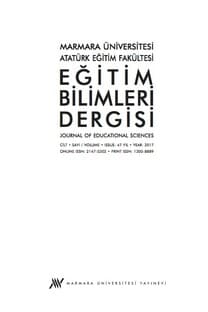İlköğretim 6. Sınıf Kesirler Ünitesinde Çoklu Zeka Kuramına Uygun Öğretimin Matematik Başarı ve Kalıcılığa Etkisi
Bu çalıșmada Çoklu Zekâ Kuramına göre hazırlanmıș öğrenme ortamlarının 6. sınıf öğrencilerinin matematik bașarıları ve kalıcılık düzeylerine etkisinin araștırılması amaçlanmıștır. Araștırma, Kocaeli ili İzmit ilçesindeki bir ilköğretim okulunun 6. sınıflarında okuyan 70 öğrenci üzerinde yürütülmüștür. Araștırma bașlamadan önce deney ve kontrol gruplarına “ Matematik Testi ” ön test “Çoklu Zekâ Belirleme” anketi ile“Kișisel Bilgiler” anketi uygulanmıștır. Deney grubun da “ Kesirler” konusu Çoklu Zekâ Kuramı doğrultusunda planlanan ders etkinlikleri ile, kontrol grubunda ise dersler gelenekselyöntemle ișlenmiștir. Çalıșmanın sonucun da her iki gruba da kesirler konusunu içeren son test, çalıșmanın bitiminden iki ay sonra kalıcılık testi olarak yeniden uygulanmıștır. Elde edilenbulgular doğrultusun da öğrencilerin “Kesirler” ünitesindeki bașarıları ve kalıcılık düzeyleri bakımından deney grubu lehine anlamlı bir fark bulunmuștur.
Anahtar Kelimeler:
Çoklu zekâ kuramı, matematik öğretimi, kesirler, kalıcılık düzeyi
The Effect of Multiple Intelligences Theory Based Mathematics Instruction on the Mathematics Achievement and Retentıon Levels In Grade 6 Fractions Unit
This research aims to instruct "fractions" to 6th graders in a learning environmentsbased on "Multiple Intelligences Theory" and investigate the effect of such anenvironment on the mathematics achievement and retention levels of 6th graders. Theresearch was conducted in a school in the İzmit Kocaeli area in two Grade 6 sections witha total of 70 students. At the beginning of the study, the experimental groups and controlgroups were given a Preliminary Mathematics Test, "Multiple Intelligences Poll" and "Personal Information Poll". In the experimental group, "Fractions" was instructed usingactivities designed according to "Multiple Intelligences Theory" while in the controlgroup "Fractions" was instructed using traditional teaching methods. . At the end of thestudy, both groups were given a "Mathematics Achievement Test" post test. Two monthslater, the post test was used again as a retention test. The findings from the researchindicated a significant difference in the students' achievement and retention levels in favorof the group experimental group, which was instructed according to the "MultipleIntelligences Theory".Key words: Multiple intelligences theory, math instruction, fraction, retention level
Keywords:
-,
___
- Wahl, M.(1999 ). “Math for Humans Teaching Math Through 8 Intelligences, Washington”: LivnLern Press,.
- Yavuz, K E.(2004). Öğrenen ve Gelișen Eğitimciler için Çoklu Zeka Teorisi Uygulama Rehberi. Ankara: Ceceli Yayınları.
- ISSN: 1300-8889
- Yayın Aralığı: Yılda 2 Sayı
- Başlangıç: 1989
- Yayıncı: Marmara Üniversitesi
Sayıdaki Diğer Makaleler
Münevver ÇETİN, İ. Hakan KARATAŞ
Dilek BATIBAY, Ortaç AYDINOĞLU
